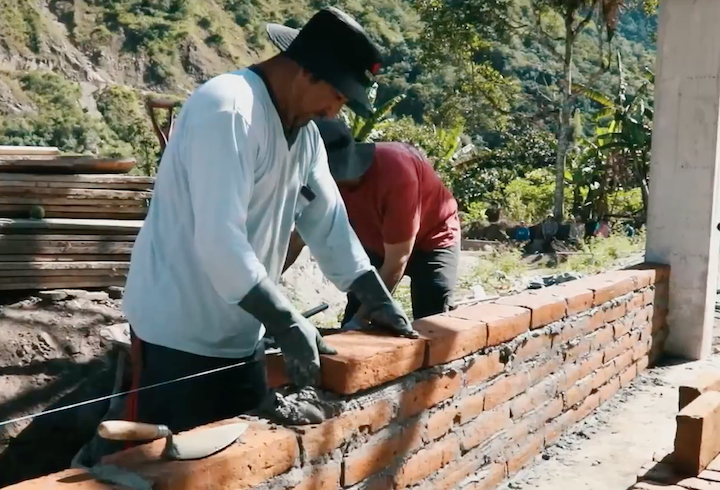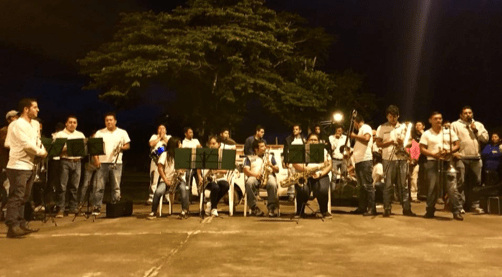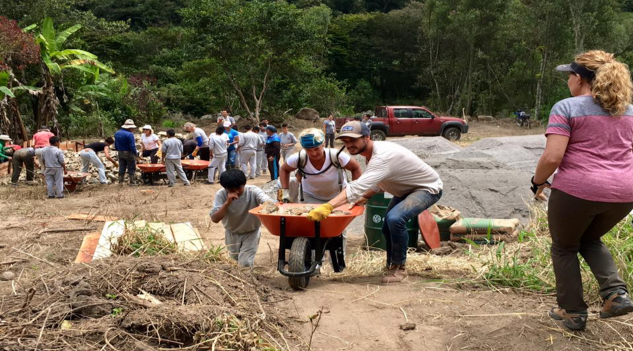For the past year and a half, the ASEA Advancing Life Foundation has partnered with Choice Humanitarian to bring not only a vocational school but also hope for a better future to the Intag region of Ecuador. This lush region is home to a large community of Ecuadorians, 87% of which live at the poverty line and only 40% of which have a high school education, creating a need for stronger economic opportunities in the area.
The vocational center – the Intacara Center – will service an estimated 1,500 families and will teach skills in masonry, carpentry, cooking, tourism and more to those reaching for a better life. When it is complete, the education the school offers will serve as a barrier against the cycles of poverty and abuse prevalent in the area.
The ASEA Advancing Life Foundation made its fourth expedition down to Ecuador in July of this year to continue the construction of the vocational school. This year’s trip included 46 participants and 40 hours of construction time, all of which were dedicated to one dream-fueling project.
The Mission
“Walking down that path leading up to the school on the first day and coming around the corner and seeing this beautiful Intacara Center in front of me, my legs started shaking, my heart was pumping so hard, and I was overcome with pride.” Said Shawn Burke, an ASEA associate who completed his second expedition this year. “I was blown away with the work that had been done and the progress that had been made.”

This year, the expedition team’s main tasks pertained to constructing the workshop which will be used to teach auto-mechanical skills. The team spent four to five hours a day constructing brick walls, digging drainage trenches, pouring sidewalks, and completing the perimeter fence. Other tasks included preparing roof panels, moving boulders to make way for trenches, and pushing bricks up steep hills. This year’s expedition brought the project to 20% completion.
“These youngsters will be able to benefit greatly from the school that we helped build.” Said Chris Draught, an ASEA employee and expedition participant. “They have so much more potential for a bright future because of the Intacara school.”
The people of the Intag region were also present and actively helping with the construction. Everyone from high school students to mothers with babies on their backs came out to do their part. Their participation in the construction is vital because it helps the community build a bond with the school and realize that the Intacara center will be for everyone seeking education, not just those who are considered privileged.
“I was so motivated to work as hard as I could. The team was small in numbers, but the electricity in the air was immeasurable.” Said Burke. “Everyone put their full heart, sweat, and soul into this project every single day. No one let up and it was so powerful watching and working with some of the most motivated people I have ever worked with.”
Between now and the next Advancing Life Expedition, the interior of the workshop will be completed and the ground will be levelled for the next building. Most importantly, the school will have their first students start in the first half of 2019.
When the land for the school was first purchased, KimMarie Larsen, ASEA managing director of events, and Charles Funke, ASEA CEO, visited the site and met with local officials. Upon meeting them, one official said, “Do you understand, what you are doing for these people? You are allowing them to finally dream.”
The People
This year’s participants ranged in age from 14 to 67 and had countless opportunities to interact with those living in the region, 44% of which depend solely on agriculture.
“One evening, we were able to play soccer with some of the children—they were so excited to have us there.” Said Draught. “They were so happy with just a few possessions and toys. It helped me see that you don’t need to have the latest and greatest to be happy, and it actually gave me the desire to spend more quality time with my own kids.”
Due to the limited number of entertaining activities in the area, the region is currently battling a trend of alcoholism. To combat this and give people something to do, Choice Humanitarian created a band comprised of local community members and hired an instructor to teach them once a week. The band performed for the community for the first time during the team’s expedition—It was immediately apparent the musicians took pride in their work and music. The band has hopes of one day including stringed instruments and becoming a symphony.

One example of the band’s impact on the community is the story of its trombone player. According to Larsen, “When I was there the two times before last year, [the trombone player] was sitting on the street corner drinking. He was the town drunk. This year, I did not see him once until the night they were performing. He was practicing his instrument, and he was very sober. He was playing and singing. It was exciting to see that in such a short time his life had changed because he now has a purpose. And that is just a sneak peek of what the school is going to do… All of the sudden these people have gone from having no hope and being stuck in this rut of doing their daily routine; but now there is hope.”
The School
The vocational center will include an administrative building, a workshop, a few bungalows, and a cultural building. The Technical University of the North, a non-profit public higher education institution located in the town of Ibarra, recently signed a five-year contract with Choice Humanitarian to provide instructors and administrative employees to the school. Because it is a government sanctioned and certified school, those who attend the Intacara Center will receive an official certification in the vocations offered there. The available vocations will include auto-mechanics, tourism, carpentry, cooking, masonry and more.

The enthusiasm for this education opportunity is palpable throughout the community. According to Larsen, “I was speaking with one gentleman and I asked him which skills he was going to learn. He said, ‘I’m going to learn all of them.’”
The Advancing Life Foundation will continue to support the school through funding and other avenues even after the school’s construction is complete. Expedition participants have even expressed interest in supporting a scholarship fund for future students. But for now, completing the school’s construction is the number one priority.
“The work we are doing there is real, and the people of those communities are counting on us to fulfill our commitment to this project.” Said Funke. ASEA’s CEO. “The satisfaction of knowing that we are helping to build something that will positively impact the lives of people for generations to come far outweighs any sacrifice required to attend an expedition.”
If you are interested in supporting the Intacara Center construction or attending a future expedition, please visit AdvancingLife.org for more info.
For information on how you can take part in the next expedition, click here.

